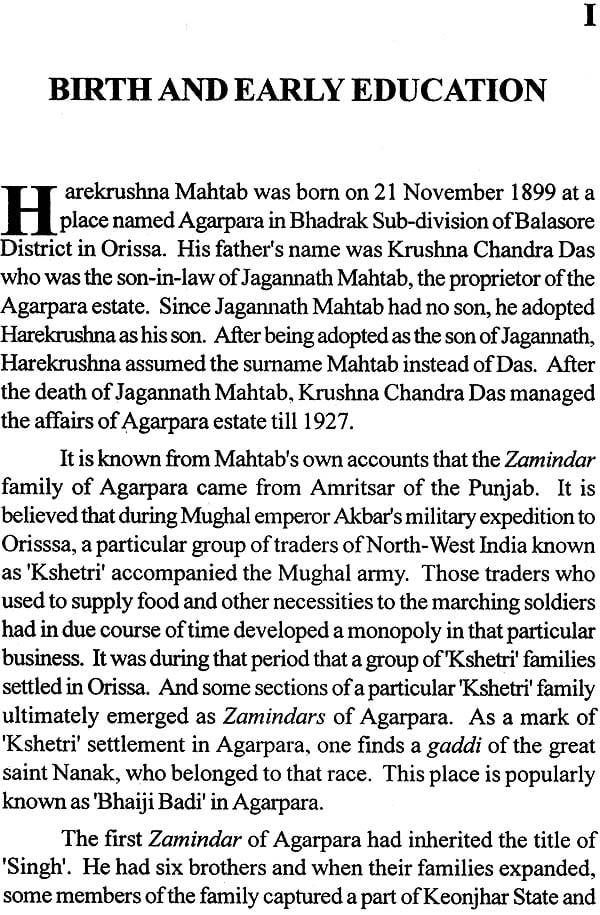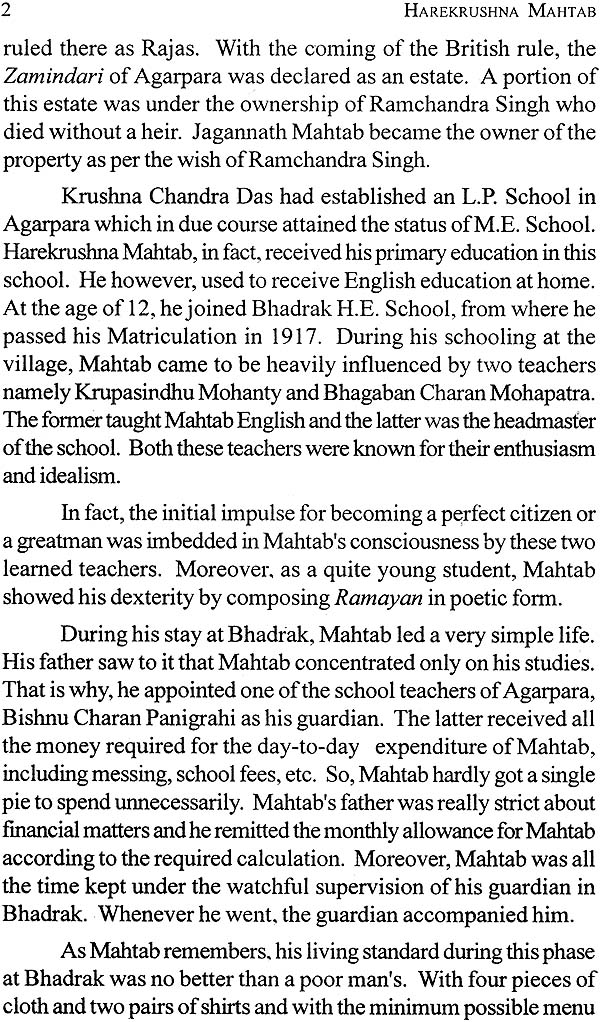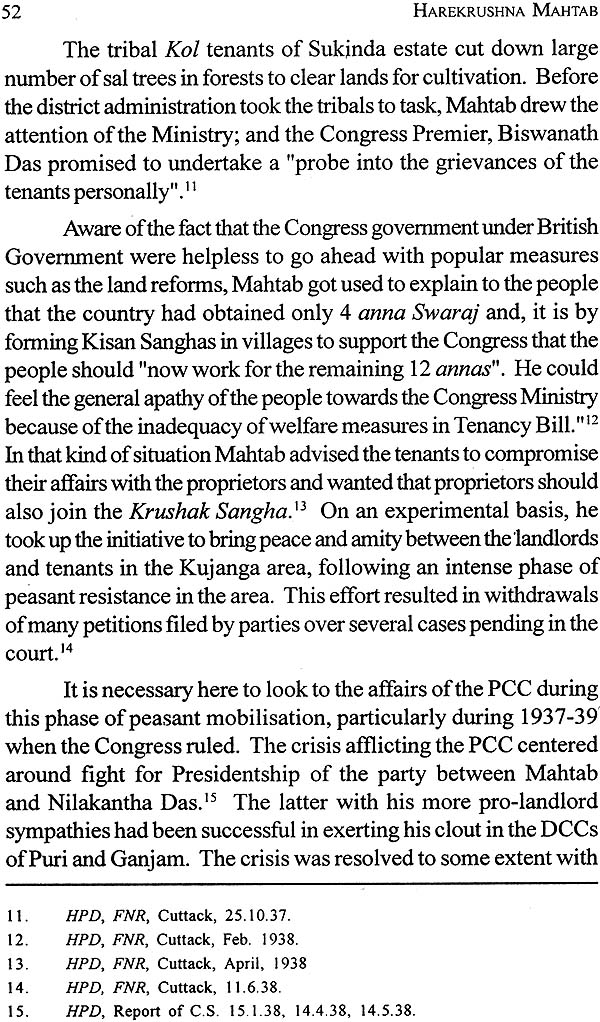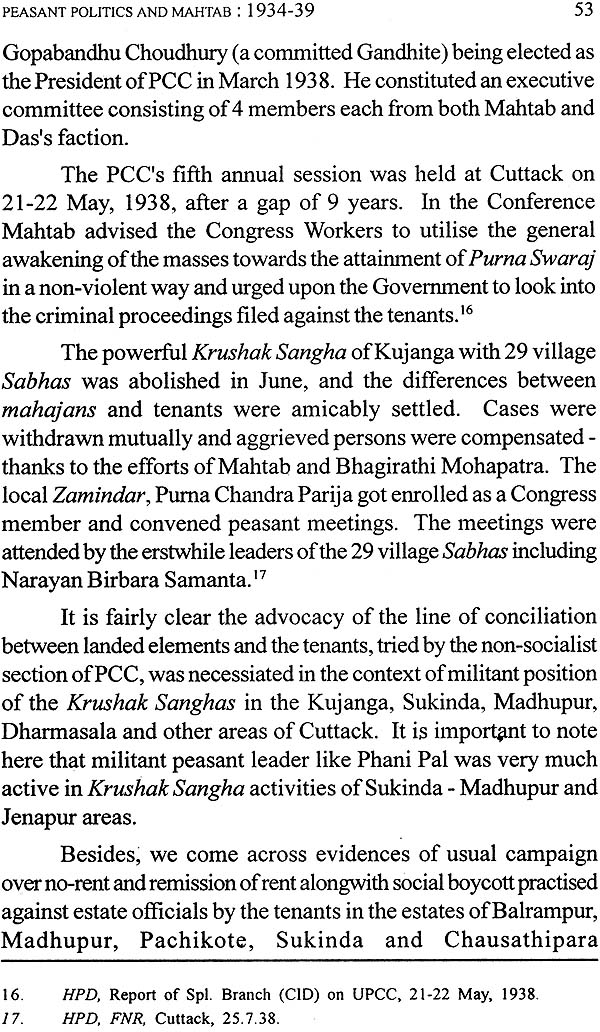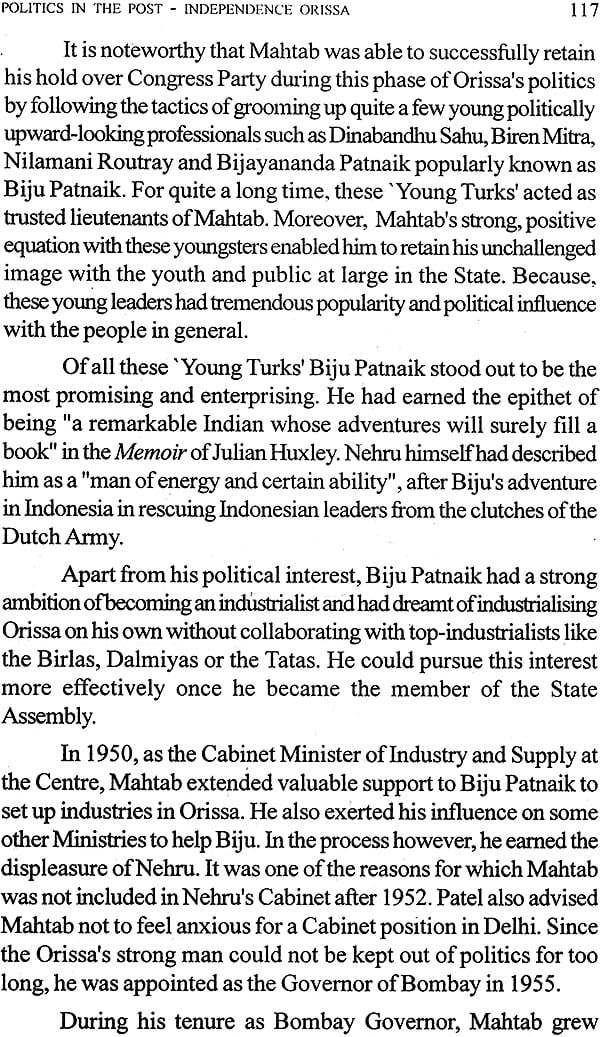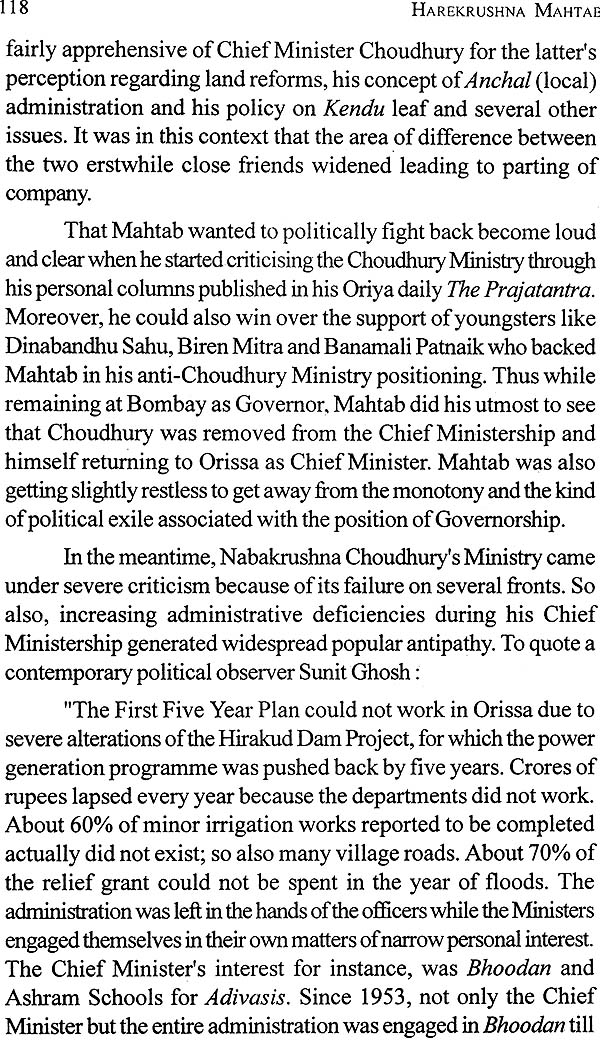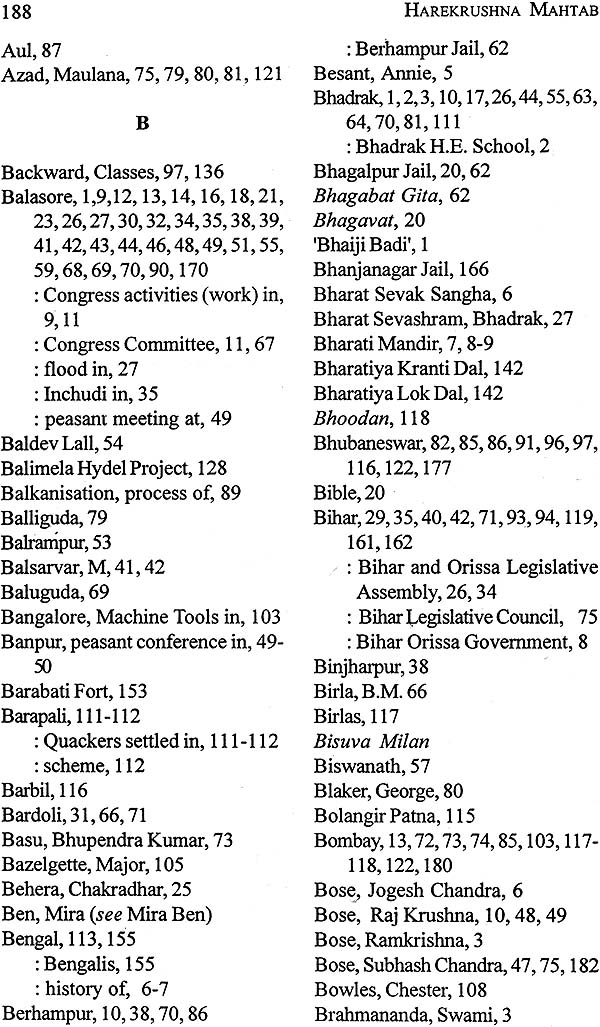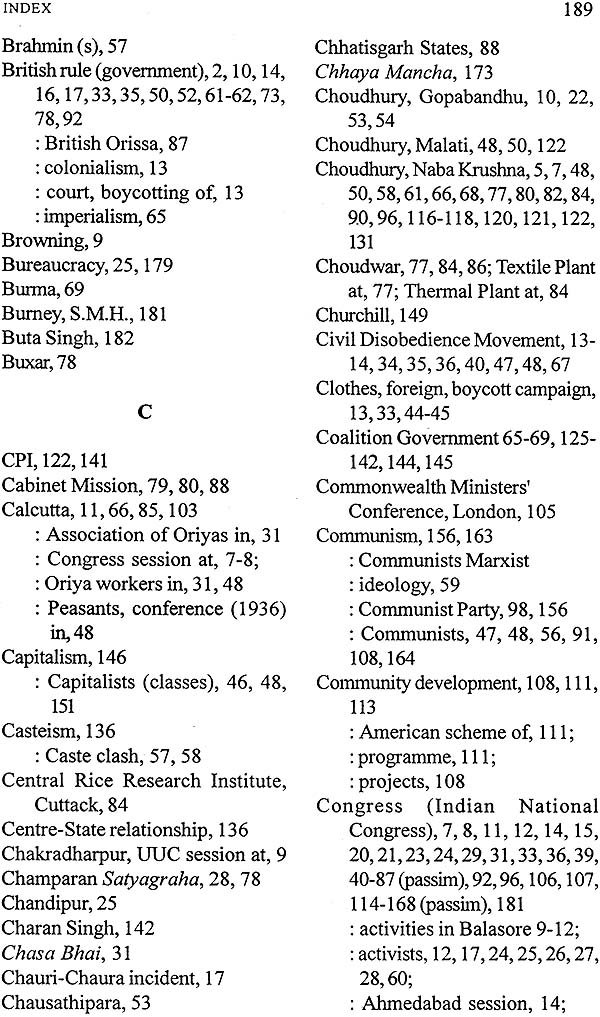
Harekrushna Mahtab
Book Specification
| Item Code: | NAI445 |
| Author: | Prof. M.N. Das and Dr. C.P. Nanda |
| Publisher: | Publications Division, Government of India |
| Language: | English |
| Edition: | 2001 |
| ISBN: | 8123009054 |
| Pages: | 209 |
| Cover: | Paperback |
| Other Details | 8.5 inch X 5.5 inch |
| Weight | 270 gm |
Book Description
The author of this book Prof. M.N.Das is the former Vice-Chancellor of Utkal University and an eminent writer. The co-author Dr. Chandi Prasad Nanda is a Research Scholar and teaches History in Ravenshaw College, Cuttak, Orissa.
Harekrushna Mahtab of Orissa rose into eminence in the wake of the national upsurge of the Gandhian era, beginning from 1919-20. Born in the last year of the 19th Century in a family of landlords, he gave up college education to join the freedom movement and waded through the ordeals of the Non-co-operation Movement of 1921, the Civil-Disobedience Movement of 1930-31 and the Quit India Movement of 1942, undergoing several terms of imprisonment and suffering enough privation and hardship.
During the first two decades of his political career, he earned distinction as a relentless leader of the peasants in their unrest against the oppressive landlords, and during the decade before independence, he distinguished himself as an outspoken critic of the princely order in India.
Sardar Vallabhbhai Patel and Harekrushna Mahtab ultimately became the chief architects of the merger of the Princely States with the Indian Union.
Like some rare stalwarts among the freedom fighters of his generation, Mahtab took to journalism to create public awareness in matters of political, social and economic issues which the country faced. By virtue of his typical personal talent he could carry his intended messages to the wider public, a talent which he amply demonstrated after independence through the editorials and columns of his daily newspaper the Prajatantra which marked a new approach in journalism to evoke popular response at the grassroots level towards the national, regional and local problems. As a literary figure, Mahtab earned reputation from early years of his public life. Apart from devoting pen to patriotic literature, he delved into serious historical researches which finally resulted in the form of a monumental History of Orissa.
Liked by Mahatma Gandhi, admired by Subhas Chandra Bose who made him a member of Congress Working Committee, and a co-prisoner with Jawaharlal Nehru, Vallabhbhai Patel, Abul Kalam Azad and others in the Ahmednagar fort prison after the Quit India Resolution, Mahtab, on the eve of India's independence was one of the top figures in the national arena. The last two British Viceroys, Lord Wavell and Lord Mountbatten, were full of regards for him, so much so that Wavell wanted to include him in the Interim Government of 1946.
With the independence of India, Mahtab was called upon to shoulder the responsibility of governing his home State of Orissa while playing a prominent role in national politics. During his first term as Chief Minister, he shifted the capital of Orissa from the millennium-old city of Cuttack to the quiet vicinity of the most ancient temple city of Bhubaneswar wherein was built a planned modem city, symbolising the emergence of new Orissa. The construction of the multipurpose Hirakud Dam and the Rourkela Steel Plant were among his other notable achievements.
In 1950, Mahtab joined the Nehru Cabinet as the Minister for Industry and Supply. During his tenure of office at the Centre, he established several public undertakings and industries like the Sindhri Fertilisers, Pimpri Pencilin, Bangalore Machine Tools, and the Hindustan Aeronautics. He also allowed private sectors to rise up for industrial development.
At the request of Shri Morarji Desai, the Chief Minister of Bombay, Nehru appointed Mahtab as the Governor of that State in March, 1955. Playing the role of an astute diplomat, he tackled the complicated linguistic and economic disputes among the people of Gujarat, Maharashtra and Karnataka regions of that undivided State. His achievements in that direction were highly appreciated by the then President of India, Rajendra Prasad and the Prime- Minister Jawaharlal Nehru.
Much before his completion of five year term as Governor of Bombay, Mahtab had to return to Orissa as its Chief Minister in 1956 and occupied that position till 1960. In building up modern Orissa, his second-term of office was as significant as his first term. The vicissitudes in Orissa's political scenario in the following years caused much worry to the veteran leader who at last felt compelled to work out timely adjustments by forming a new political party named the Jana Congress which, in alliance with the Swatantra Party, came to power in 1967.
Mahtab retired from electoral politics in 1977, though not from active politics for nearly a decade thereafter. Continuing as a researcher and a literary person, he made substantial contribution to the history and literature till the last moment of his life. His last book titled "While Serving My Nation: Recollections of a Congress Man" was released in New Delhi on 25 Dec. 1986. Within weeks Mahtab's eventful life came to an end.
Once, Sardar Vallabhbhai Patel paid his compliments to Mahtab by saying "not that Mahtab loved Orissa less but that he loved India more". Adored by the people as the 'Utkal Keshari' (the Lion of Orissa). Mahtab dominated the political, social and cultural stage of his State as a colossus for more than half a century. At the same time he was regarded and respected as one of the foremost leaders of India during the era of struggle and in post-independence India.
| Preface | ||
| I | Birth and Early Education | 1 |
| II | College Education and the Appeal of Nationalist Politics | 5 |
| III | Politics of Swaraj and Mahtab: 1923-29 | 22 |
| IV | Mahtab and Civil Disobedience Movement | 33 |
| V | Peasant Politics and Mahtab: 1934-39 | 47 |
| VI | Mahtab and Individual Civil Disobedience Movement | 57 |
| VII | Quit India and Mahtab | 65 |
| VIII | Builder of "Modern Orissa"1945-50 | 78 |
| IX | Mahtab in Nehru Cabinet | 100 |
| X | Politics in the Post-Independence Orissa | 114 |
| XI | Mahtab: A Pioneer of Rural Awareness | 143 |
| XII | Mahtab and the Prajatantra | 169 |
| XIII | Last Days of Mahtab | 178 |
| Bibliography | 183 | |
| Index | 187 |
